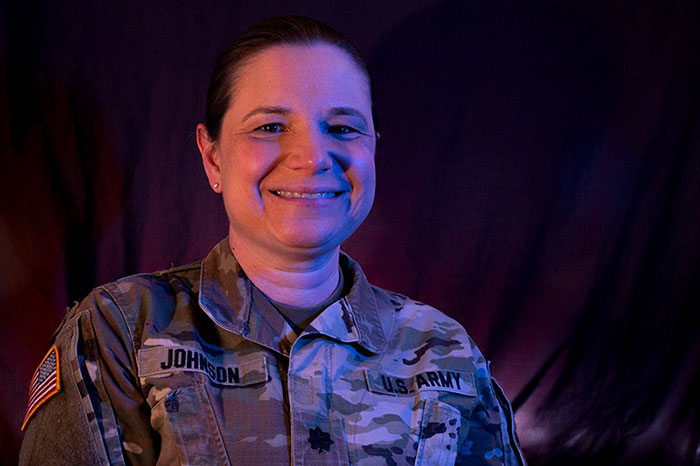Women's History Month: Scientist, Soldier, medical developer – USAMMDA microbiologist sets example for next gen women leaders

Women have a rich history in the U.S. military, since before the nation's founding. During Women's History Month, we are highlighting women across the U.S. Army Medical Materiel Development Activity (USAMMDA) and the contributions they make each day to the Army's medical development and sustainment missions.
U.S. Army Lt. Col. Sheila Johnson has a heart for service. Born into a military family in Alaska, Johnson spent most of her childhood in Pensacola, Florida, where her father served in the U.S. Navy. Today she serves as a product manager with the U.S. Army Medical Materiel Development Activity at Fort Detrick, Maryland.
After graduating from Florida State University with a bachelor's degree in biochemistry, Johnson went on to earn her doctorate in microbiology and immunology from the University of Florida. What else would a budding microbiologist from a military family do than join the U.S. Army to pursue her passions? Johnson commissioned in 2007 and credits her personal history and a strong support system of family and friends with the success she has found as an Army officer.
"I grew up in a very military family. My Dad and uncle were both in the Navy and my grandfather was in the Army," said Johnson, who balances her career as a product manager with her life as a mom to a 12-year-old son. "It seemed a natural career choice for me, so I found an Army health care recruiter when I was finishing up grad school."
Seventeen years in uniform have taken Johnson across the country and across the world, with duty stations in Naval Station Great Lakes, Illinois; Silver Spring, Maryland; Kisumu, Kenya; Joint Base Lewis-McChord, Washington; and now with USAMMDA's Warfighter Protection and Acute Care Project Management Office. As a key member of the WPAC team, Johnson manages both the Canine Blood Products and the Battlefield Wound Infection Prevention and Treatment portfolios as multidisciplinary Integrated Product Team chair.
Leadership requires experience like plants need water, and Johnson's career is marked by ever- increasing levels of responsibility as she has ascended the ranks. The lessons of her career give Johnson the perspective many successful leaders gain through years of service, and she offers advice and sage counsel with the heart of an experienced and trusted servant-leader.
"Mostly I try to lead by example and then share my experiences and successes with anyone who asks and is willing to listen," said Johnson. "The Army offers many advantages: educational opportunities to earn degrees and certifications; the opportunity to learn new skills of leadership, communication, and conflict resolution; and the ability to make a positive impact and contribute to a greater purpose."
Johnson's years of experience in and around U.S. Army research make her an exceptional role model for up-and-coming young women who may choose to follow in her Army bootsteps. In the highly competitive career field of Science, Technology, Engineering, and Mathematics, Johnson is proof that experience transcends gender roles and success as a key team member often speaks louder than words.
"Strong women leaders in key leadership positions can challenge antiquated stereotypes and advocate for opportunities for all team members to thrive," said Johnson. "This inclusive leadership promotes a sense of belonging and respect among team members that leads to stronger collaboration and cohesion.
"Currently, I am fortunate to serve under fantastic female leadership in WPAC who support our entire team. As much as possible, I follow their lead to cultivate an inclusive and collaborative environment that empowers others to succeed. Over my career, I've realized that in certain situations I need to communicate more assertively to ensure my perspective is acknowledged and respected."
Johnson's resume is chock-full of distinguished titles and prestigious awards — she was inducted as a member of the Order of Military Medical Merit last year for her contributions to the work of the Army Medical Department — yet she has spent much of her career doing hands-on work in a lab, which is natural for a microbiologist in a research field. Joining USAMMDA has served to broaden Johnson's academic scope and helped prepare her for an even more impactful career in medical development.
"Before coming to USAMMDA I knew very little about [medical development]; I was only familiar with the science and technology side of things," said Johnson. "I have a few acquisition-savvy friends who told me how wonderful it was, and they convinced me to apply for the position. I have loved every minute of it since then and can't imagine doing anything else!
"I love knowing that I'm making a difference and doing something important. Medical product development is unique; I contribute to advancements in health care that directly impact — and often save — people's lives. It's definitely not easy; this position is challenging and requires problem-solving that constantly pushes me to grow and develop as a professional."













